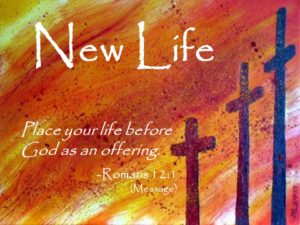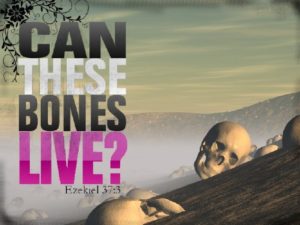“Mortal, can these bones live?” (Ezekiel 37:3). This question asked of Ezekiel in the valley of dry bones may hit awfully close to home for us and for our world. And yet, even when we are in the midst of it, we still know the end of the story, we know that God’s final word is always life – life, new and abundant.
Have you ever had one of those weeks, or months or years? Those days when we might as well be those dry bones in the valley that Ezekiel envisions. Our energy and spirit dissipated by grief or anger or hurt. Our bones may not yet be dry and without form – but our minds can’t quite muster up the energy to get our bodies moving.
This is where we find Ezekiel and the people of Israel to whom he is called by God to serve and lead – they are a dry, disjointed, lifeless valley of bones – a people in need of hope – a people desperate for the promise of grace.
This is a fitting story for the season of Lent – as we look to next Sunday and Jesus’ dramatic entrance into Jerusalem and the fast-moving events of Holy Week that will lead to his gruesome death.
This story of the valley of dry bones and the story of the raising of Lazarus are those stories foreshadowing the gift of new life that lies ahead – but there is one major problem – one huge obstacle in our path – in order to receive that gift, it seems, we inevitably must confront the desolate valley or the proverbially darkened tomb.
Ezekiel knows this very well. We hear his words:
The hand of the Lord came upon me, and he brought me out by the spirit of the Lord and set me down in the middle of a valley; it was full of bones. He led me all around them; there were very many lying in the valley, and they were very dry. (Ezekiel 37:1-2)
Ezekiel’s vision truly begins in a nightmare. An unnamed valley stuffed full with bones is hardly a place one chooses to be. The prophet soon learns, after he is led around the desolate valley, that these are very dry bones indeed.
Dry bones mean that they have been there a long time. How did they get there? Was there a terrible battle? Or is this a massive cemetery resurfacing after many years? Our imagination is free to wonder.
Then the Spirit asks Ezekiel a provocative question, saying: “Mortal, can these bones live?” (Ezekiel 37:3)
Breathing in the dry air of that awful valley, I know what my answer would be – ARE YOU KIDDING ME!?
But Ezekiel is perhaps a little bit more measured in answering God – with a much safer response, saying: “O Lord God, you know.” Ezekiel, perhaps rightly, is deferring to God on that one – but God is having none of it – Ezekiel is not going to be allowed to sit this one out – instead the Spirit instructs him:
“Prophesy to these bones, and say to them: O dry bones, hear the word of the Lord. Thus says the Lord God to these bones: I will cause breath to enter you, and you shall live. I will lay sinews on you, and will cause flesh to come upon you, and cover you with skin, and put breath in you, and you shall live; and you shall know that I am the Lord.” (Ezekiel 37:4-6)
And so, at the Spirit’s urging, Ezekiel takes a swing at it – and sure enough, the deathly silent valley began to rattle as the bones began to find their place again, one connected to the next. Soon they are covered in fresh sinew and layers of flesh. But there was something that was still missing – something vital to this equation of new life. It was the very thing that God had breathed into humans at the very outset of creation.
Ezekiel is again commanded to direct the breath into those newly formed bodies, saying:
Thus says the Lord God: Come from the four winds, O breath, and breathe upon these slain, that they may live.” (Ezekiel 37:9)
And we hear the results in Ezekiel’s own words:
I prophesied as he commanded me, and the breath came into them, and they lived, and stood on their feet, a vast multitude. (Ezekiel 37:10)
This story is yet another chapter in the amazing grace of our God.
- This grace that initiated the whole human enterprise by making humans from dust and breathing life into them.
- This grace that initiated the entire Israelite project, choosing to take slaves from Egypt, giving them God’s own law, and bringing them to a good land.
- This same grace that initiates once again, God’s spirit that brings new life to a people dead as stone.
- This very same grace that seeks us out in our own lost-ness, in our own fear, in our own places in life where the breath does not come easily and God’s spirit seems so far away.
This vision of dry bones, at times, can feel awfully close to home for us and for our world. And yet, even when we are in the midst of it, we still know the end of the story, we know that God’s final word is always life – life, new and abundant.
Said another way, we are Ezekiel’s dry bones, waiting for a fresh breath of the spirit – waiting for that new flesh and skin so that we might be brought back to live as God created us to live – so that we might feel that breath of life renewing our spirits for all that is to come.
Let us pray: Holy God, we find ourselves in need of your presence more often than we care to admit. And for some of us Lord that moment might be right now. Wherever we are, whatever our needs, breathe your life-giving spirit into us today. May we know and experience your grace and your love that knows no bounds or limits. Use us to reflect and share that grace in the world around us. In Jesus’ name. Amen.
Rev. John Berg
Gloria Dei Lutheran Church
Northbrook, IL
Consulted Resources:
- Becoming Whole Again: Reflections on Ezekiel 37:1-14, John C. Holbert, March 30, 2014
- Commentary on Ezekiel 37:1-14, Patricia Tull, workingpreacher.org, April 2, 2017



